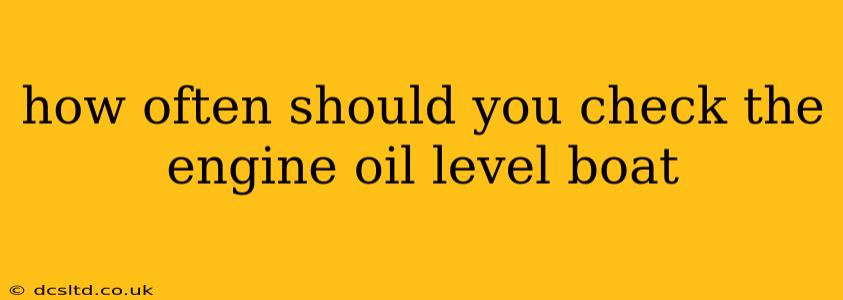Maintaining your boat engine's oil level is crucial for its longevity and performance. Neglecting this simple task can lead to costly repairs or even engine failure. But how often should you actually check it? The answer isn't a simple number, as it depends on several factors. Let's dive in.
How Often Should I Check My Boat's Engine Oil?
The general recommendation is to check your boat's engine oil before each use. This pre-use check is the most important, giving you peace of mind and the chance to address any issues before they become problems. Think of it as a crucial part of your pre-departure checklist, just like checking fuel levels and inspecting your safety equipment.
However, the frequency can also depend on factors such as:
What type of boat engine do you have?
Different engine types may have slightly varying recommendations. Consult your owner's manual for the most accurate guidance. While a pre-use check is generally advised, some manuals might suggest less frequent checks under specific, ideal operating conditions. Always prioritize the manufacturer's instructions.
How often do you use your boat?
If you're a frequent boater, checking more regularly might be wise. Even if you're only using it for short trips, daily checks before each trip are still a good habit. For those who only use their boat seasonally, a thorough check before the first outing and another before putting it away for the season is essential.
What kind of conditions are you operating in?
Harsh operating conditions, such as prolonged periods at high RPMs, can lead to increased oil consumption. If you frequently operate your boat under strenuous conditions, more frequent checks are recommended.
What are the signs of low engine oil?
Beyond the scheduled checks, certain signs might indicate a need for immediate attention:
Is there a noticeable drop in oil pressure?
Many boat engines have oil pressure gauges. A sudden drop in pressure can signal critically low oil levels. Stop the engine immediately and investigate.
Do you hear unusual noises from the engine?
Knocking, rattling, or other unusual noises could indicate insufficient lubrication due to low oil. Immediate action is necessary.
Is the engine overheating?
Low oil levels can lead to overheating, as the oil is vital for cooling the engine. If your engine is overheating, check the oil level immediately.
How do I check my boat engine oil level?
This process varies slightly depending on your engine. However, it generally involves:
- Ensure the engine is cold: Checking the oil level while the engine is hot can give an inaccurate reading.
- Locate the dipstick: This is usually clearly marked.
- Remove the dipstick, wipe it clean, and reinsert it fully.
- Remove the dipstick again and check the oil level. It should be between the minimum and maximum marks.
Remember to always refer to your owner's manual for specific instructions for your boat engine model.
What should I do if the oil level is low?
If you find that the oil level is low, you need to add oil carefully, using the correct type specified in your owner's manual. Avoid overfilling, as this can be just as harmful as underfilling. If the oil level is consistently low, you may have a leak that needs professional attention.
By following these guidelines and diligently checking your boat engine oil level, you'll significantly reduce the risk of costly damage and ensure many years of reliable performance on the water. Regular maintenance isn't just a good idea—it's essential.
